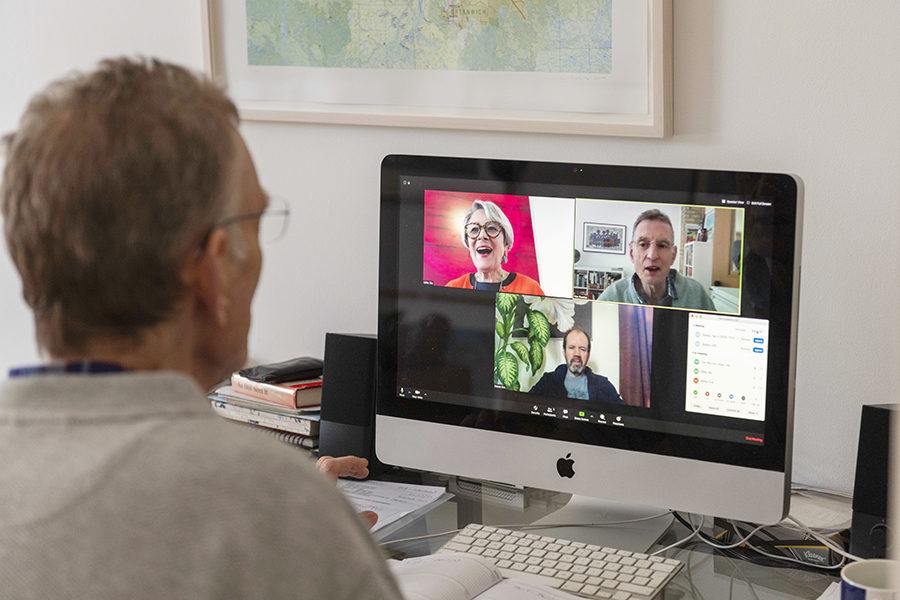Regrouping online: the GDP on Zoom

The Garden Day Programme is up and running online providing our usual services via unusual (for us) methods. It’s been a steep learning curve for staff and clients but until we can work face-to-face again, it’s a great interim solution and an instructive process, reports manager Tim Penrice.
On 17 March, Boris and HMG defined Garden Day Programme staff as non-essential workers and told us we had to stay 2 metres apart from each other and clients and work from home. How to follow government instructions and continue to provide addiction treatment and personal support to 10 vulnerable clients for an unspecified period? That was the question – and the challenge.
Our immediate response was to try to maintain a daily phone call to our clients to check that their feelings of confusion and fear were heard and understood and that we, and others within the Kairos Community, were available to support and inform as best we could through ‘this difficult time’. ‘Keep it in the day’ was never more appropriate.
Few of us have lived through such strange days and I’m not alone in recognising that I needed the daily contact with clients and colleagues every bit as much as they did. ‘’We are all in this together facing the same challenges’’ became our mantra.
Our first idea that phone calls were the best way to support locked-down clients was unsatisfactory as the calls became conversations because we didn’t have much in the way of practical help to give. We soon realised that the best help we could provide was to continue with group therapy and Step work in as ‘normal’ a surrounding as we could create – and that meant Zoom.
The Zoom group
Zoom has become a popular word and at the GDP we have found it a practical app that can help create an atmosphere of community and therapeutic being for the price of an internet connection and a smartphone. It has enabled us to maintain a temporary online timetable.
GDP counsellors Simon Eve and latterly Gillie Sliz responded to the challenge and we were treated to a series of colourful backdrops as we toured Gillie’s home looking for the best place to work the new technology. She has settled now in front of a large colourful abstract painting with her handsome and attentive housemate Monty perfectly at ease and keeping quiet at her feet.
Simon has a splendid plant next to his armchair in front of his computer that gives a reassuring image of both growth and strength, and somehow these Zoom views give the clients a fuller and more real picture of the human being who is working to help them understand themselves.
In the time we have been working with Zoom, our clients have become increasingly tech savvy. Some have attended group from their rooms in Linden Grove, some from their gardens, one from a basement in Victoria. Yet wherever they are, what these addicts are chasing today is not a chemical or a drink but a strong internet signal. They want to join in.
Some of our clients haven’t coped with the change and switched off but new clients have joined; the majority have risen to the challenge and entered into the spirit of discovery and recovery online. They have adapted and taken risks, they have learned and they have helped us to learn that if our programme is structured and boundaried, safe and focussed, then the reality of getting well in group can be transferred successfully to the virtual.
To connect, contribute and belong
Once lockdown is over and we are at last safe to sit in a circle again talking face-to-face about our feelings, we will probably chalk up this experience to another event that we found we could cope with after initial anxiety and doubt.
I hope we don’t look back at online therapy as a second-rate group experience because although it does blur the full impact of human connection, awareness and empathy, it demands of its participants extra concentration and care that is generously rewarded with understanding.
The need to connect, contribute and belong is central to human wellbeing, and to watch these instincts in action online has been a powerful experience of the adaptability of people, and a clear example of how essential it is to express our core human values, no matter the obstacles.
